2019下半年英语四级语法知识点:介词讲解
2019年12月英语四级高级语法讲解:从句的复习

2019年12月英语四级高级语法讲解:从句的复习从句的复习复合句:定语从句、名词性从句、状语从句。
定语从句:1. that,which,who的使用。
一个句子当中有两个相同的名词,将其中的一个名词进行替换,假如是人,用who;假如是物,用which;that既可以指人又可以指物。
2. 谓语动词(结构)和后面的介词有两种关系:关系紧密&关系疏远;定语从句中假如谓语结构和介词关系紧密,则介词必须保留在谓语结构的后面,不能做任何位置的改动;假如谓语结构和介词关系疏远,介词一般提到which/who/that的前面; 介词加which正好表示时间,可以表达成whe- n;表示地点时,可以表达成where;表示原因时,变成why;3. 限定性定语从句和非限定性定语从句。
限定性定语从句:定语从句和关系词关系非常紧密,删掉定语从句后,整个句子意思会改变;非限定性定语从句:定语从句和关系词关系不是很紧密,删掉定语从句后,整个句子意思不会改变,定语从句只起到补充说明的意义;(2)非限定性定语从句:eg: He won the first place in the competition, which is out of our expectation.② 非限定性定语从句:which引导非限制性定语从句只能放在后面,as则只能放在句子前面名词性从句:主语从句、宾语从句、表语从句及同谓语从句;形式:名词+从句;连接词取决于后面的从句是什么样的形式;假如是陈述句,直接加that引导;一般疑问句:先把一般疑问句变成陈述句语序,然后在其前加上weather或者if;特别疑问句:直接保留特别疑问词,后面的句子变成陈述句语序;定义:在句子中起名词作用的句子,且在句子中能担任主语、宾语、表语、同谓语、介词宾语等成分;eg. Yuminhong, the president of New Oriental School.状语从句:两个独立的句子中间用一些含义不同的连接词连接;状语从句用来表达两个句子之间的逻辑关系;分成原因状语、条件状语、结果状语、时间状语、地点状语、让步状语、目的状语、比较状语、方式状语等九大类型;定语从句是名词+关系词+从句,关系词的用法取决于名词的问题;名词性从句:同谓语从句:名词+关系词+从句,关系词跟后面的从句相关系,假如是陈述句,直接加that引导;一般疑问句:先把一般疑问句变成陈述句语序,然后在其前加上weather或者if;特别疑问句:直接保留特别疑问词,后面的句子变成陈述句语序;宾语从句:动词+关系词+从句;表语从句:系动词+关系词+从句;主语从句:关系词+从句+谓语动词;名词性从句,其关系词的来源取决于后面的从句的性质。
介词的考点归纳

介词的考点归纳-标准化文件发布号:(9556-EUATWK-MWUB-WUNN-INNUL-DDQTY-KII介词的考点归纳:(重点记忆一些方位介词、时间介词、方式介词及一些介词短语)介词是一种虚词,它不能单独担任句子成分,必须与名词或代词或相当于名词的其他词类、短语或从句构成介词短语,才能担任句子成分。
一、介词的种类和介词短语的用法1.介词的种类介词由词形上可分为简单介词和短语介词。
简单介词知识一个单词,如:in,on,after等。
短语介词是由两个以上单词集合而成,如:out of,in front of,because of,instead of等。
2.介词短语的用法①作定语介词短语作定语时,一律后置。
The book on the desk in mine.桌子上的书是我的。
He bought a house of five rooms.他买了一所有五个房间的房子。
A gentleman in white came into the hall.一个身穿白衣的绅士走进了大厅。
②作状语介词短语作状语时,修饰动词、形容词、副词或者整个句子。
Classes begin at eight.(修饰动词)八点钟开始上课。
Jane looks young for her age.(修饰形容词)珍妮看起来比她的实际年龄年轻。
The school is not far from my house.(修饰形容词)学校离我家不远。
To my surprise, Li Ming passed the exam at all.(修饰全句)使我吃惊的是,李明居然考试及格了。
③作表语He is in danger.他处于危险之中。
We are against/for you.我们反对/支持你。
It was because of the heavy rain, we couldn’t go out.因为这场大雨,我们出不去了。
介词怎么考知识点总结
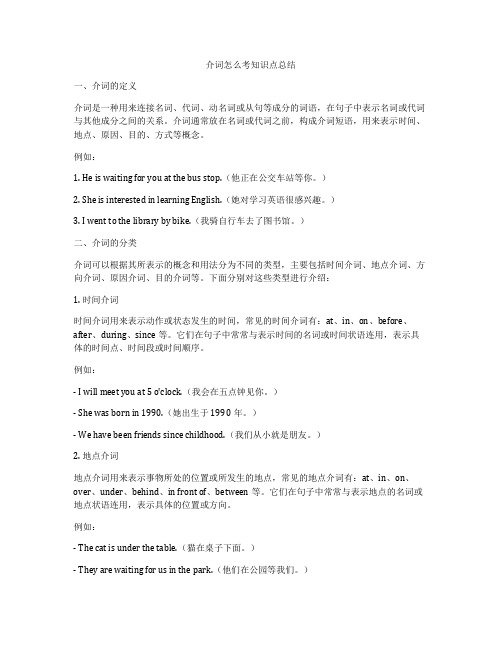
介词怎么考知识点总结一、介词的定义介词是一种用来连接名词、代词、动名词或从句等成分的词语,在句子中表示名词或代词与其他成分之间的关系。
介词通常放在名词或代词之前,构成介词短语,用来表示时间、地点、原因、目的、方式等概念。
例如:1. He is waiting for you at the bus stop.(他正在公交车站等你。
)2. She is interested in learning English.(她对学习英语很感兴趣。
)3. I went to the library by bike.(我骑自行车去了图书馆。
)二、介词的分类介词可以根据其所表示的概念和用法分为不同的类型,主要包括时间介词、地点介词、方向介词、原因介词、目的介词等。
下面分别对这些类型进行介绍:1. 时间介词时间介词用来表示动作或状态发生的时间,常见的时间介词有:at、in、on、before、after、during、since等。
它们在句子中常常与表示时间的名词或时间状语连用,表示具体的时间点、时间段或时间顺序。
例如:- I will meet you at 5 o'clock.(我会在五点钟见你。
)- She was born in 1990.(她出生于1990年。
)- We have been friends since childhood.(我们从小就是朋友。
)2. 地点介词地点介词用来表示事物所处的位置或所发生的地点,常见的地点介词有:at、in、on、over、under、behind、in front of、between等。
它们在句子中常常与表示地点的名词或地点状语连用,表示具体的位置或方向。
例如:- The cat is under the table.(猫在桌子下面。
)- They are waiting for us in the park.(他们在公园等我们。
)- The book is on the shelf.(书在书架上。
大学英语四级语法知识讲解

大学英语(CET--4) 语法学习提纲一、词类、句子成分和构词法:1、词类:英语词类分十种:名词、形容词、代词、数词、冠词、动词、副词、介词、连词、感叹词。
1、名词(n.):表示人、事物、地点或抽象概念的名称。
如:boy, morning, bag, ball, class, orange.2、代词(pron.):主要用来代替名词。
如:who, she, you, it .3、形容词(adj..):表示人或事物的性质或特征。
如:good, right, white, orange .4、数词(num.):表示数目或事物的顺序。
如:one, two, three, first, second, third, fourth.5、动词(v.):表示动作或状态。
如:am, is,are,have,see .6、副词(adv.):修饰动词、形容词或其他副词,说明时间、地点、程度等。
如:now, very, here, often, quietly, slowly.7、冠词(art..):用在名词前,帮助说明名词。
如:a, an, the.8、介词(prep.):表示它后面的名词或代词与其他句子成分的关系。
如in, on, from, above, behind.9、连词(conj.):用来连接词、短语或句子。
如and, but, before .10、感叹词(interj..)表示喜、怒、哀、乐等感情。
如:oh, well, hi, hello.2、句子成分:英语句子成分分为七种:主语、谓语、宾语、定语、状语、表语、宾语补足语。
1、主语是句子所要说的人或事物,回答是“谁”或者“什么”。
通常用名词或代词担任。
如:I’m Miss Green.(我是格林小姐)2、谓语动词说明主语的动作或状态,回答“做(什么)”。
主要由动词担任。
如:Jack cleans the room every day. (杰克每天打扫房间)3、表语在系动词之后,说明主语的身份或特征,回答是“什么”或者“怎么样”。
全国英语等级考试四级语法知识:介词
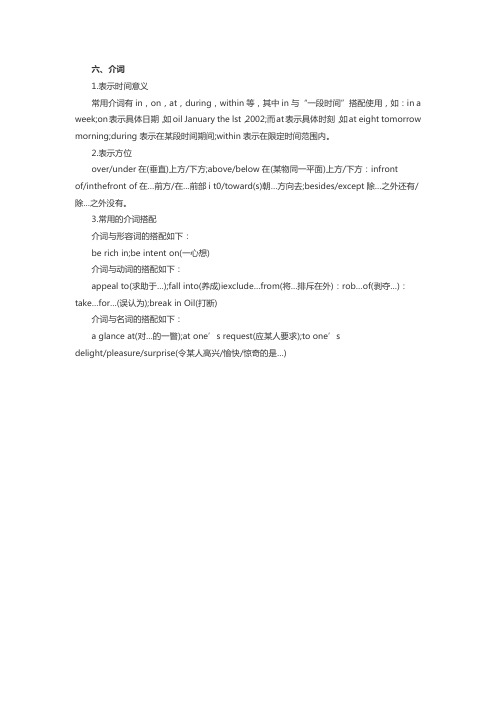
六、介词
1.表示时间意义
常用介词有in,on,at,during,within等,其中in与“一段时间”搭配使用,如:in a week;on表示具体日期,如oil January the lst,2002;而at表示具体时刻,如at eight tomorrow morning;during表示在某段时间期间;within表示在限定时间范围内。
2.表示方位
over/under在(垂直)上方/下方;above/below在(某物同一平面)上方/下方:infront
of/inthefront of在…前方/在…前部i t0/toward(s)朝…方向去;besides/except除…之外还有/除…之外没有。
3.常用的介词搭配
介词与形容词的搭配如下:
be rich in;be intent on(一心想)
介词与动词的搭配如下:
appeal to(求助于…);fall into(养成)iexclude…from(将…排斥在外):rob…of(剥夺…):take…for…(误认为);break in Oil(打断)
介词与名词的搭配如下:
a glance at(对…的一瞥);at one’s request(应某人要求);to one’s
delight/pleasure/surprise(令某人高兴/愉快/惊奇的是…)。
专四语法第6节-介词板块

介词介词是用于名词、名词词组或相当于名词词组的结构之前,表示词语之间意义关系的词类。
介词能和不同的词语搭配,表示不同的意义。
按照其结构,可大致将其划分为三类:简单介词、双重介词和短语介词。
介词和介词短语一起构成的短语在句子中可作表语、状语、定语、补语等。
而按照其在句子中的语义关系,可表示时间、原因、方式、让步、条件、对比、伴随、地点、目的等。
介词虽然是虚词,但仍然值得学习,英语之所以丰富、灵活,与其多变的介词使用不无关系,学生在专四备考的过程中,也应该注意到这一考点。
1. What a nice day! How about the three of us _____ a walk in the park nearby?A. to takeB. takeC. takingD. to be taken2. The Clarks haven’t decided yet which hotel______.A. to stayB. is to stayC. to stay atD. is for staying3. Which of the following prepositional phrases can function as an adverbial?A. Despite the rain, everyone enjoyed the trip.B. The man with a beard is talking to the manager.C. Every precaution was taken against the failure of the plan.D. Are you sur e of Simon’s disappearance?4. Which of the following italicized phrases indicates purpose?A. She said it for fun, but others took her seriously.B. For all its effort, the team didn’t win the match.C. Linda has worked for the firm for twenty years.D. He set out for Beijing yesterday.5. Which of the following prepositional phrases is an adverbial of concession?A. They used the box for keeping treasures.B. I stepped aside for her to get in first.C. For all that he seems to dislike me, I still like him.D. The parents bought a birthday cake for their son.6. Which of the following italicized phrases indicates CAUSE?A. Why don’t you do it for the sake of your friends?B. I wish I could write as well as you.C. For all his efforts, he didn’t get an A.D. Her eyes were red from excessive reading.7. _______, he is ready to accept suggestions from different sources.A. Instead of his contributionsB. For all his notable contributionsC. His making notable contributionsD. However his notable contributions8. The scenery here is _______ description. It’s very beautiful.A. underB. beyondC. withoutD. over9. He will leave for Europe _____ the Eve of Christmas.A. inB. onC.atD. with10. It is _____no use to reason with that rude person.A. forB. ofC. withD. by11. _______ his cold, his still attend the meeting.A. RegardlessB. HoweverC. Even althoughD. Despite12. _____ all probability nobody would have complained if Mary had not told the neighbors about it.A. ToB. InC. ForD. At13. The police let him go, because they didn’t find him guilty _______ the murder.A. ofB. inC. overD. on14. This question admits ______ several answers.A. forB. withC. ofD. to15. Please dispose ______ those old newspapers while you’re cleaning up the room.A. outB. ofC. awayD. in16. They had a pleasant chat _____ a cup of coffee.A. forB. withC. duringD. over17. The membership card entitled him ______ certain privileges in the club.A. onB. inC. atD. to18. I was very much put _____ by Mark’s rude behavior; it really annoyed me.A. overB. offC. upD. by19. Nowadays advertising costs are no longer in reasonable ____ to the total cost of the product.A. proportionB. correlationC. connectionD. correspondence20. The album might have ___ had it been less expensive.A. worked outB. fallen throughC. caught onD. fitted in21. Her suggestion is that you’d better make allowances____ the expense.A. ofB. forC. intoD. about22. When we entered the classroom, the little girl was still absorbed_____ her study.A. forB. onC. atD. in23. Due to efforts of conservationists, few people are ignorant _____ the problems of endangered species.A. aboutB. ofC. onD. with24. My sister likes eating very much but she isn’t ____ about the food she eats.A. specialB. peculiarC. particularD. unusual25. Like other residents, both Tom and Jerry pride themselves_____ their ability to know all the parts of this city.A. ofB. inC. onD. for26. Stressful environments lead to unhealthy behaviors such as poor eating habits, which _____ increase the risk of heart disease.A. by turnsB. in returnC. by chanceD. in turn27.Watching me pulling the calf awkwardly to the barn, the Irish milkmaid fought hard to ___ her laughter.A. hold backB. hold onC. hold outD. hold up28. Dr. Mary’s talk was generally received, but as for the statistics she____, I don’t think of all of them wereup-to-date.A. referred toB. related toC. adjusted toD. appealed to29. Many of the scientists and engineers are judged_____ how great their achievements are.A. in spite ofB. in ways ofC. in favor ofD. in terms of30. I am surprised that the film should appeal_____ people from all walks of life.A. toB. forC. withD. on31. We should divide all the potatoes____ two piles and separated the good ones _____ the bad ones.A. from; byB. into; fromC. into; intoD. from; into32. The young singer is quite popular _____ the public. She’s made a remarkable achievement____ a girl of herage.A. with; toB. to; for C.with; for D. for; to33. The weather this month has been good ________ .A. on the wholeB. generally speakingC. above allD. on one hand34. After finishing middle school, my sister did nothing____ at home.A. but to readB. but readC. besides readingD. except to read35. They held a ceremony ________ those killed in the battle.A. in honor ofB. instead ofC. in favor ofD. by means of36. Write your name and address on your bag ________ you lose it.A. in any caseB. in caseC. in no caseD. in that case37. He is running_____ the wind towards the east of the station_______ Tom running____ the right.A. down; and; onB. against; with; onC. for; with; inD. with; while; to38. What we expect from you is working hard______ hardly working.A. less thanB. rather thanC. as well asD. as much as39. Our club is open to everyone ______ age, sex or educational background.A. due toB. except forC. along withD. regardless of40. Check carrots, potatoes, onions and any other vegetables ______ and immediately use or throw away any whichshow signs of rotting.A. in demandB. in storeC. on loanD. on sale41. Tom always goes jogging in the morning and he usually does push-ups too to stay______.A. in placeB. in orderC. in shapeD. in fashion42. ______ the school, the village has a clinic, which was also built with government support.A. In reply toB. In addition toC. In charge ofD. In place of43. While staying in the village, James unselfishly shared whatever he had with the village without asking foranything______.A. in returnB. in commonC. in turnD. in place44. It is unbelievable that Mr. Lucas leads a simple life ______ his great wealth.A. withoutB. despiteC. inD. to45. Mrs. Smith finds it hard to clear up the mess, as her children are always____ whenever she tries toA. in the wayB. on watchC. in sightD. on the line46. An artist who was recently traveling on a ferry to the southern island discovered_____ a long lost antique Greekvase.A. at randomB. by chanceC. in turnD. on occasion47. I am always delighted when I receive an email from you. ______ the party on July 1st shall be pleased to attend.A. On account ofB. In response toC. In view ofD. With regard to48. — I'm looking for a nearby place for my holiday. Do you have any good idea?— How about the Moon Lake? It is ______ easy reach of the city.A. byB. beyondC. withinD. from49. When will Britain ___ Japan in industrial production?A. catch up withB. catch up onC. catch up inD. catch up to50. It will be a great help if you go to the store and get what we need for dinner. ______, I will set the table.A. As a resultB. On the wholeC. In the meanwhileD. As a matter of fact。
CET4&CET6介词用法大全
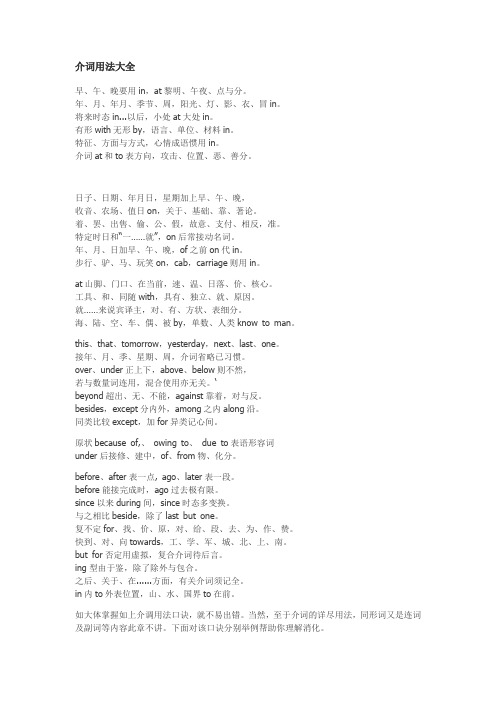
介词用法大全早、午、晚要用in,at黎明、午夜、点与分。
年、月、年月、季节、周,阳光、灯、影、衣、冒in。
将来时态in...以后,小处at大处in。
有形with无形by,语言、单位、材料in。
特征、方面与方式,心情成语惯用in。
介词at和to表方向,攻击、位置、恶、善分。
日子、日期、年月日,星期加上早、午、晚,收音、农场、值日on,关于、基础、靠、著论。
着、罢、出售、偷、公、假,故意、支付、相反,准。
特定时日和“一……就”,on后常接动名词。
年、月、日加早、午、晚,of之前on代in。
步行、驴、马、玩笑on,cab,carriage则用in。
at山脚、门口、在当前,速、温、日落、价、核心。
工具、和、同随with,具有、独立、就、原因。
就……来说宾译主,对、有、方状、表细分。
海、陆、空、车、偶、被by,单数、人类know to man。
this、that、tomorrow,yesterday,next、last、one。
接年、月、季、星期、周,介词省略已习惯。
over、under正上下,above、below则不然,若与数量词连用,混合使用亦无关。
…beyond超出、无、不能,against靠着,对与反。
besides,except分内外,among之内along沿。
同类比较except,加for异类记心间。
原状because of,、owing to、due to表语形容词under后接修、建中,of、from物、化分。
before、after表一点, ago、later表一段。
before能接完成时,ago过去极有限。
since以来during间,since时态多变换。
与之相比beside,除了last but one。
复不定for、找、价、原,对、给、段、去、为、作、赞。
快到、对、向towards,工、学、军、城、北、上、南。
but for否定用虚拟,复合介词待后言。
ing型由于鉴,除了除外与包合。
英语四级语法要点:介词+反身代词的常用搭配

英语四级语法要点:介词+反身代词的常用搭配搭配一among oneself该搭配中的反身代词通常为ourselves, themselves,且通常与动词agree, argue, quarrel, decide, divide, talk 等搭配,表示“彼此”“互相”“……之间”之类的意思。
如:They were busy arguing among themselves. 他们忙着互相争论。
We were always quarrelling among ourselves. 我们之间老是互相争吵。
They talked among themselves while they waited. 他们一边等着一边互相谈话。
Volunteers divided the different jobs among themselves. 志愿者们分担各种不同的工作。
The trainees decide among themselves what programs to take. 受训者自行选择所学课程。
The trouble was they couldn’t agree among themselves. 麻烦的是他们自己不能取得一致的意见。
有时也与discussion, dispute等名词搭配。
如:They had a heated discussion among themselves. 他们之间进行了热烈的讨论。
They tried to settle disputes among themselves. 他们试图解决彼此之间的纠纷。
搭配二between ourselves该搭配为英语中的固定短语,意思是“勿与外人道私下说的话”“咱们私下说说(不足为外人道)”等,在具体语境中通常可以有比较灵活的翻译。
如:All this is between ourselves. 这些我们只是私下说说。
英语四级重要知识点
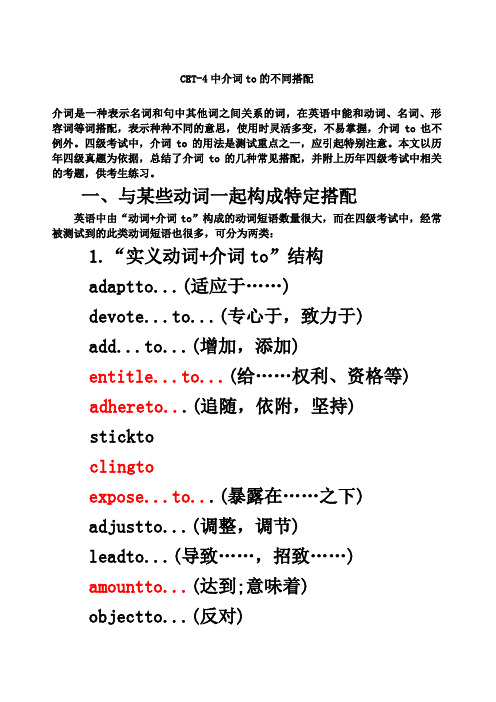
CET-4中介词to的不同搭配介词是一种表示名词和句中其他词之间关系的词,在英语中能和动词、名词、形容词等词搭配,表示种种不同的意思,使用时灵活多变,不易掌握,介词to也不例外。
四级考试中,介词to的用法是测试重点之一,应引起特别注意。
本文以历年四级真题为依据,总结了介词to的几种常见搭配,并附上历年四级考试中相关的考题,供考生练习。
一、与某些动词一起构成特定搭配英语中由“动词+介词to”构成的动词短语数量很大,而在四级考试中,经常被测试到的此类动词短语也很多,可分为两类:1.“实义动词+介词to”结构adaptto...(适应于……)devote...to...(专心于,致力于)add...to...(增加,添加)entitle...to...(给……权利、资格等)adhereto...(追随,依附,坚持)sticktoclingtoexpose...to...(暴露在……之下)adjustto...(调整,调节)leadto...(导致……,招致……)amountto...(达到;意味着)objectto...(反对)appealto...(恳求;呼吁)owe...to...(欠……;对……负有……)applyto...(应用,运用;向……申请)reactto...(对……做出反应)attach...to...(系上,附加于,使附属)referto...(论及,参照;委托)attendto...(倾听;照顾,料理)resortto...(诉诸于……)attributeto...(把……归因于,认为是……的结果)respondto...(……做出反应)belongto...(属于)seeto...(负责,留意,照料)compare...to...(与……比较;将……比作为)stickto...(坚持)confessto...(坦白,坦承)subject...to...(使遭受…,使蒙受……)conformto...(顺从,与……一致)turnto...(翻到;向……求助)contributeto...(有助于,促使)yieldto...(屈服于)...历年四级考题中与上述短语相关的考题很多,下面仅列出一些典型的例子(选项中以黑体字为正确答案):(1)Thisisthenursewho________tomewhenIwasinhospital.(CET-4,,52)(2)Iwouldneverhave________acourtoflawifIhadn'tbeensodesperate.(CET-4,,66)(3)He________tohiscustomersandhalvedtheprice.(CET-4,,65)(4)Eatingtoomuchfatcan________heartdiseaseandcausehighbloodpressure.(CE T-4,,55)(5)Ididn'.(CET-4,,35)(6)Themaninthecornerconfessedto________alietothemanagerofthecompany.(CE T-4,,58)(7)BecauseEdgarwasconvincedoftheaccuracyofthisfact,he________hisopinion .(CET-4,,60)(8)Thereishardlyanenvironmentonearth________somespeciesofanimalorotherh asnotadaptedsuccessfully.(CET-4,,53)(9)Themanagerassuredthecustomerthathiscomplaintwouldbeseen________immed iately.(CET-4,,70)(10)Policehave________tothepublictocomeforwardwithanyinformationwhichmi ghthelpthemintheirinquiries.(CET-4,,44)(11)Isitadvisableto________ourbodytothesunlight(CET-4,,62)2.“be+过去分词/形容词+to”结构beaddictedto...(对……上瘾)beopposedto...(反对)beattachedto...(附属于)besubjectto...(易遭……的;以……为条件的)bedueto...(归功于……,因为……)beused/accustomedto...(习惯于……)beobjectedto...(反对)...相关的四级考题如下:(12)Thecommitteeistotallyopposed________anychangesbeingmadeintheplans.( CET-4,,61)(13)Althoughpunctualhimself,theprofessorwasquiteused________lateforhisl ecture.(CET-4,,31)'being'being(14)Thematchwascancelledbecausemostofthemembers________amatchwithoutast andardcourt.(CET-4,,48)二、与某些名词一起构成特定搭配此类名词与to一起构成固定结构“名词+介词to”,可分为两类:1.某些固有名词,如admission,access,answer,approach,barrier,k ey,right,solution等;2.由相关动词派生而来的名词,如exposure,objection,reaction,response等。
英语介词知识点的归纳
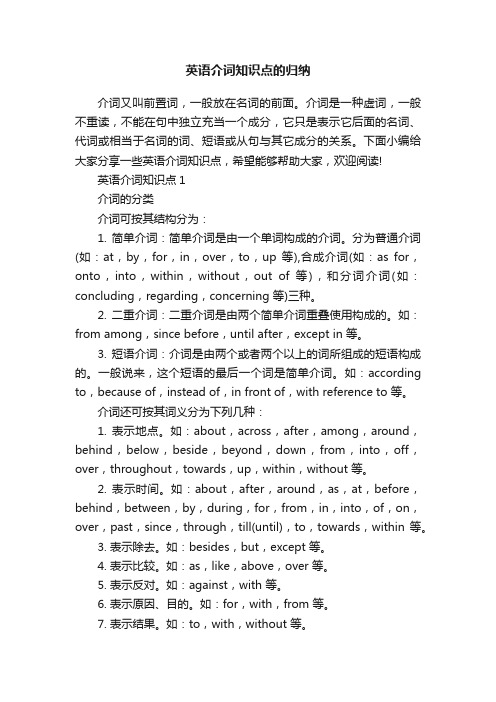
英语介词知识点的归纳介词又叫前置词,一般放在名词的前面。
介词是一种虚词,一般不重读,不能在句中独立充当一个成分,它只是表示它后面的名词、代词或相当于名词的词、短语或从句与其它成分的关系。
下面小编给大家分享一些英语介词知识点,希望能够帮助大家,欢迎阅读!英语介词知识点1介词的分类介词可按其结构分为:1. 简单介词:简单介词是由一个单词构成的介词。
分为普通介词(如:at,by,for,in,over,to,up 等),合成介词(如:as for,onto,into,within,without,out of 等),和分词介词(如:concluding,regarding,concerning 等)三种。
2. 二重介词:二重介词是由两个简单介词重叠使用构成的。
如:from among,since before,until after,except in 等。
3. 短语介词:介词是由两个或者两个以上的词所组成的短语构成的。
一般说来,这个短语的最后一个词是简单介词。
如:according to,because of,instead of,in front of,with reference to 等。
介词还可按其词义分为下列几种:1. 表示地点。
如:about,across,after,among,around,behind,below,beside,beyond,down,from,into,off,over,throughout,towards,up,within,without 等。
2. 表示时间。
如:about,after,around,as,at,before,behind,between,by,during,for,from,in,into,of,on,over,past,since,through,till(until),to,towards,within 等。
3. 表示除去。
如:besides,but,except 等。
介词用法讲解-四级语法

介词⽤法⼝诀:早、午、晚要⽤in,at 黎明、午夜、点与分。
年、⽉、年⽉、季节、周,阳光、灯、影、⾐、冒in。
将来时态in...以后,⼩处at ⼤处in。
有形with ⽆形by,语⾔、单位、材料in。
特征、⽅⾯与⽅式,⼼情成语惯⽤in。
介词at 和to 表⽅向,攻击、位置、恶、善分。
⽇⼦、⽇期、年⽉⽇,星期加上早、午、晚,收⾳、农畅?值⽇on,关于、基穿?靠、著论。
着、罢、出售、偷、公、假,故意、⽀付、相反,准。
特定时⽇和"⼀……就",on 后常接动名词。
年、⽉、⽇加早、午、晚,of 之前on 代in。
步⾏、驴、马、玩笑on,cab,carriage 则⽤in。
at ⼭脚、门⼝、在当前,速、温、⽇落、价、核⼼。
⼯具、和、同随with,具有、独⽴、就、原因。
就……来说宾译主,对、有、⽅状、表细分。
海、陆、空、车、偶、被by,单数、⼈类know to man。
this、that、tomorrow,yesterday,next、last、one。
接年、⽉、季、星期、周,介词省略已习惯。
over、under正上下,above、below 则不然,若与数量词连⽤,混合使⽤亦⽆关。
beyond 超出、⽆、不能,against 靠着,对与反。
besides,except 分内外,among 之内along 沿。
同类⽐较except,加for 异类记⼼间。
原状because of,、owing to、due to 表语形容词under后接修、建中,of、from 物、化分。
before、after 表⼀点, ago、later 表⼀段。
before 能接完成时,ago 过去极有限。
since 以来during 间,since 时态多变换。
与之相⽐beside,除了last but one。
复不定for、找、价、原,对、给、段、去、为、作、赞。
快到、对、向towards,⼯、学、军、城、北、上、南。
2019年6月大学英语四级语法考点复习:absent
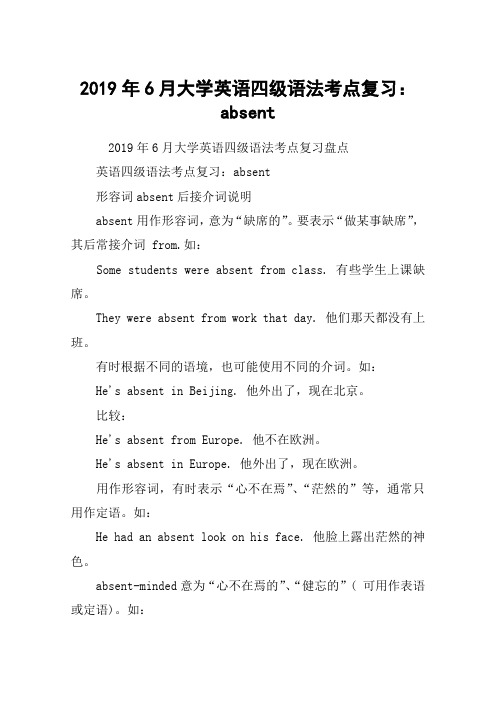
2019年6月大学英语四级语法考点复习:
absent
2019年6月大学英语四级语法考点复习盘点
英语四级语法考点复习:absent
形容词absent后接介词说明
absent用作形容词,意为“缺席的”。
要表示“做某事缺席”,其后常接介词 from.如:
Some students were absent from class. 有些学生上课缺席。
They were absent from work that day. 他们那天都没有上班。
有时根据不同的语境,也可能使用不同的介词。
如:
He's absent in Beijing. 他外出了,现在北京。
比较:
He's absent from Europe. 他不在欧洲。
He's absent in Europe. 他外出了,现在欧洲。
用作形容词,有时表示“心不在焉”、“茫然的”等,通常只用作定语。
如:
He had an absent look on his face. 他脸上露出茫然的神色。
absent-minded意为“心不在焉的”、“健忘的”( 可用作表语或定语)。
如:
He is always absent-minded. 他老是心不在焉。
2019四级考试语法知识详解(2)

2019四级考试语法知识详解(2)相关英语名词格的概述格(case)是名词或代词具有的形式及其变化,表示与其它词的关系。
英语的名词有三个格:主格(nominative case)、宾语(objective case)和所有格(possessive case)。
但英语的名词除所有格有形式的变化外,主格和宾格都没有形式变化。
名词在句中是主格或是宾格,主要通过它在句中的作用和位置来确定。
如:My brother always misplaces his schoolbag.我弟弟常常乱放他的书包。
(brother是主语,故为主格;schoolbag是misplaces的宾语,故是宾格)Every written sentence should begin with a capital letter.每个书写出来的句子开头都要用大写字母。
(sentence在句中作主语,故是主格;letter是介词with的宾语,故是宾格)表示有生命的东西的名词的所有格表示有生命的东西的名词(人或动物)的末尾,加上's,即构成所有格,可放在另一名词之前,作定语用。
如:John's friend约翰的朋友Xiao Wang's notebook小王的笔记本children's books儿童读物my father's room我父亲的房间[英语语法手册]英语名词所有格与它所修饰的名词的逻辑关系名词所有格在逻辑上可能是它所修饰的名词的主语,也可能是它所修饰的名词的宾语。
1)名词所有格是它所修饰的名词的逻辑主语。
如:the Party's concern of the younger generation党对年青一代的关怀the hatred of the soldiers for the enemy士兵对敌人的仇恨2)名词所有格是它所修饰的名词的逻辑宾语。
如:the reactionary rule's overthrow反动统治的被****the occupation of the city by the enemy敌人对该城的占领"of+名词所有格"上面讲的两种所有格的形式能够结合起来,构成"of'+所有格"形式,表示部分观点或感情色彩。
小学四年级英语考试知识点:介词、连词和感叹词

小学四年级英语考试知识点:介词、连词和叹息词1.介词:介词是一种虚词,不可以独自使用,一定在介词后边加上个名词或代词使用,作句子成份。
介词后边的名词(或相当于名词的其余词)叫做介词的宾语。
介词和介词宾语合称为介词短语。
介词短语在句中可作壮语、定语或表语。
介词如 : in 在里面 on 在上边 under 在下边等。
in the classroomin the treein the hallon the roadon the deskon the floorunder the tableunder the bedunder the chair2.连词:连词是用来连结词与词、短语与短语、句子与句子等的词叫连词。
连词是一种虚词,在句子中不可以独自作句子成分。
连词分两类:一类叫等立连词,另一类叫附属连词。
(1). 等立连词是用来连结同样的词、词组和分句的。
等立连词有很多我们此刻只学到了and 和 but,其余的此后学到再介绍。
如: A and B ; blue and white ;an apple and a banana;a car and a bus;Lucy and Ben ; Ben and Kitty ;This is a lorry and that’s a drill.I like dolls and you like robots.(2). 附属连词是用来惹起从句的、附属连词又分为1)惹起名词性从句的连结词,如: if ,that 等。
2)惹起壮语从句的连结词,如:when , after ,befare 等。
此后会渐渐学到再介绍。
3.叹息词 : 表示说话人的某种感情(吃惊,快乐,难过等)的词叫叹息词。
叹息词后常用叹息号。
常用的叹息词有:oh(表示诧异或难过),ah(表示诧异或满意),hello(常被用来打招呼相当于汉语的“喂!”),well (表示吃惊,无奈)如: Hello.Are you Mary?。
大学英语四级介词总汇全集

大学英语四级介词总汇全集本文档旨在为大学英语四级考试提供介词的总结和应用。
以下是常见的英语介词及其用法:1. in用于表示位置、时间和方式,常见的用法有:- 表示位置:in the house(在房间里)、in the city(在城市里)- 表示时间:in the morning(在早上)、in August(在八月)- 表示方式:in English(用英语)、in a hurry(匆忙地)2. on用于表示位置、时间和某些媒介,常见的用法有:- 表示位置:on the table(在桌子上)、on the wall(在墙上)- 表示时间:on Monday(在星期一)、on Christmas Day(在圣诞节)- 表示媒介:on TV(在电视上)、on the internet(在互联网上)3. at用于表示位置、时间和某些事件,常见的用法有:- 表示位置:at the park(在公园里)、at the mall(在商场里)- 表示时间:at 3 o'clock(在三点钟)、at night(在晚上)- 表示事件:at a party(在派对上)、at a meeting(在会议上)4. for用于表示目的、时间和利益,常见的用法有:- 表示时间:for three hours(三个小时)、for a week(一个星期)- 表示利益:good for your health(对你的健康有益)、do it for me(替我做)请注意,以上只是介词的一小部分,还有许多其他常见的介词及其用法。
相信通过研究和实践,你会更加熟练地运用这些介词。
祝你在英语四级考试中取得好成绩!。
英语四级语法 (3)

英语四级语法1. 介词1.1 什么是介词介词是一类连接名词(或代词)与其他词或词组的虚词。
它们常用来表示时间、地点、方向、原因、目的、手段等关系。
常见的英语介词有in, on, at, by, with, for等。
1.2 常见介词的用法1.2.1 in用法1:表示在某个范围或位置内。
•We live in the city.•My birthday is in October.•He is in the classroom.用法2:表示在某个时间或阶段。
•She will arrive in an hour.•I’ll see you in a week.•We’ll start the meeting in five minutes.1.2.2 on用法1:表示在某个平面或表面上。
•The book is on the table.•She put the plates on the shelf.•The picture is hanging on the wall.用法2:表示在某个具体日期或时间。
•We have a meeting on Monday.•I have an appointment with the doctor on Thursday.•The concert is on Saturday night.1.2.3 at用法1:表示在某个具体地点。
•I met her at the park.•Let’s meet at the coffee shop.•He is waiting for you at the airport.用法2:表示在某个具体时间。
•The party starts at 8 o’clock.•The train arrives at noon.•They usually have dinner at 7 p.m.1.2.4 by用法1:表示通过某种手段或方法。
英语学习干货:语法知识要记牢,最怕混淆乱答题

英语学习干货:语法知识要记牢,最怕混淆乱答题介词一、知识概述介词是一种虚词,一般在句子中不重读,也不能单独充当句子成分,但与它的介词宾语一起构成介词短语,就可以在句子中作状语、定语和表语。
介词又称前置词,一般位于名词或代词的前面,表示该词与句子其他成分的关系。
在学习介词时,最重要的是掌握介词的用法,动介词组的搭配,时间介词、方位介词、方向介词、位置介词、成语介词以及动向介词和静向介词的比较和区别。
二、介词的定义及句法功能介词是一种虚词,在句中不单独作任何句子成分,只表示其后的名词或相当于名词的词语与其他句子成分的关系。
介词后的名词,或相当于名词的其他词组、短语或从句,称为介词宾语。
介词和介词宾语一起构成介词短语。
介词短语在句中主要用作定语、状语、表语和宾语补足语。
The boy over there is my brother.(作定语)A friend in need is a friend indeed.(作定语)I shall meet you at the entrance of Qianmen Hotel.(作地点状语)To their surprise, they saw not locusts, but seagulls.(作原因状语)I’ll be in the office every afternoon.(作表语)He isn’t at home(作表语)The farmer made the king out of the water.(作宾语补足语)I found everything in good order(作宾语补足语)三、介词与其他词类的固定搭配。
介词和动词、形容词、名词等常构成固定搭配。
也就是说,在这些词的后面,常常要求用一定的介词。
1、形容词与介词的固定搭配有些形容词后面要求用固定的介词,这类介词常见的有:about, at, for, from, in, of, to, with(1)形容词+aboutcareful about hopeful about sure aboutHe is careless about his clothes(2)形容词 +atgood at surprised at angry at(3)形容词 + forfamous for ready for sorry forI’m terrible sorry for telling him the truth.(4)形容词 + fromdifferent from safe fromHe was absent from class this morningMy sister is different from me in many ways.(5)形容词 + ininterested in successful inHe is interested in making model ships.2、名词与介词的固定搭配(1)名词 + forHe made up an excuse for being late.Did you find the cause for your failure?(2)名词 + inHe has some difficulty in translating the bookShe has made great progress in English.(3)名词 + ofShe found another way of solving the problemHe forms a bad habit of getting up late(4)名词 + onThere have been several attacks on foreigners recently.Have pity on me!(5)名词 + withI wanted to have a talk with youHe is always getting into trouble with the police连词一、知识概述连词是一种虚词,不能在句子中单独作句子成分,也没有句子重音,在句子中只起连接词与词、短语与短语、句子与句子以及从句的作用。
- 1、下载文档前请自行甄别文档内容的完整性,平台不提供额外的编辑、内容补充、找答案等附加服务。
- 2、"仅部分预览"的文档,不可在线预览部分如存在完整性等问题,可反馈申请退款(可完整预览的文档不适用该条件!)。
- 3、如文档侵犯您的权益,请联系客服反馈,我们会尽快为您处理(人工客服工作时间:9:00-18:30)。
2019下半年英语四级语法知识点:介词讲解
介词
介词总是与名词或与之相当的词搭配构成短语出现在考试中。
在六级
词汇考试中虽然不会单独出现考试介词的题目,但是搭配是经常考试的。
介词的用法很灵活,准备考试时着重掌握简单介词和成语介词即可,这两部分出现的比例比较高。
下面通过几道例题分析几个比较重
要的介词以及词组。
例如:
Idon‘tthinkthatthisquestionissubordinate________themainaimof ourcompany.
A.with
B.to
C.for
D.on
本题需要选出的是与subordinate相搭配的介词,只有to能够与之搭配,表示比……次要的意思,其他选项均不能与之连用。
另外有一个
相关的词组是inferiorto意为地位较低的,较差的。
Ourhouseisaboutamilefromthestationandtherearenotmanyhouses___
_____.
A.inbetween
B.amongthem
C.farapart
D.fromeachother
准确答案是A。
答案中inbetween为固定搭配,表示在两者之间的意思。
farapart意思是相距甚远。
amongthem表示在……之间但用在三者或
者三者以上。
fromeachother指两者间的相互关系。
类似的相关介词词组的例子非常多,举不胜举。
介词早在高中时期我
们就学过,以后持续的学习中都是对它们的各种用法的补充与扩展。
因为它们出现的频率非常高,所以平时不用死记硬背,积累下来的也
有很多。
在做练习的时候要对自己常做错的介词反复练习,直到准确
的概念非常牢固地扎根在脑子里,因为错过的地方很容易再次犯错。
介词大多十分短小,在做题的时候要格外细心。
